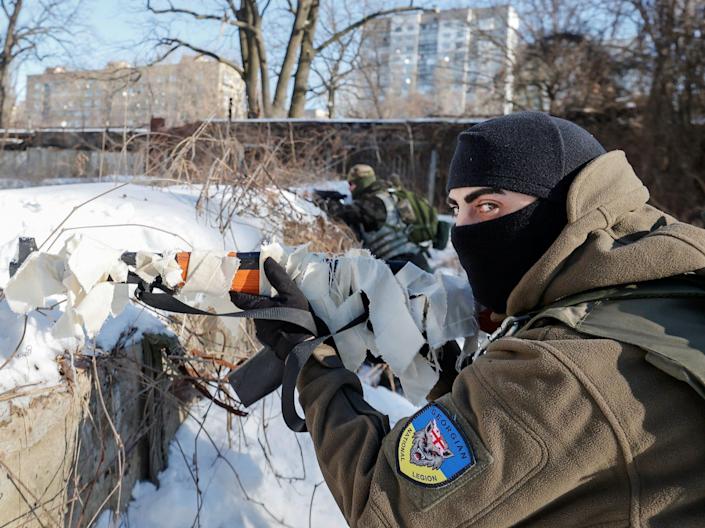
-
People from around Europe and the US are planning to travel to Ukraine and fight Russian forces.
-
Two British veterans said they plan to join the Georgian National Legion, which has been fighting separatists in the Donbas.
-
“If I was to die, you can either die doing something like this, which is the right thing to be doing,” one British veteran told Insider. “Or you can die potentially like an old man who can’t even wipe their own ass and doesn’t even know who they are.”
Before Joseph Lister left his home in Sussex Thursday, he left letters for his family.
As with any war, there’s a good chance you won’t come back.
While the United Kingdom has backed Ukraine against Russia’s invasion with sanctions and aid, it hasn’t sent in troops. So Lister decided to go and defend Ukraine on his own. He couldn’t just sit around and expect everyone else to do it, he reasoned.
“Well, everyone’s afraid of dying aren’t they?” Lister told Insider. “But, realistically, if I was to die, you can either die doing something like this, which is the right thing to be doing. Or you can die potentially like an old man who can’t even wipe their own ass and doesn’t even know who they are.”
Lister is one of the thousands of people who have told authorities in Ukraine that they plan to take up arms against the Russian invasion. Ukrainian President Volodymyr Zelensky announced the formation of the Ukrainian foreign legion — officially called the International Legion of Territorial Defense of Ukraine — shortly after Russia’s invasion of the country in February.
“Every friend of Ukraine who wants to join Ukraine in defending the country, please come over,” Zelensky announced at a press conference. “We will give you weapons.”
George, another British national, working in security risk operations and living in Gloucester, told Insider he’s also planning to join the fight in Ukraine. A veteran of the UK army with 12 years of experience in armed forces “operating around the globe,” he said he knows around 20 people personally who are planning to fight, and started an online group of internationals planning to ward off Russian forces.
His whole family has served in militaries, he said, so he thinks they’ll understand when they see the letters he left.
“It’s not a very nice conversation to have,” said George, who asked Insider to withhold his real name because he hasn’t yet told his family about his planned departure to Ukraine this weekend. “So most people are leaving letters for the families so that when you go, you can say ‘I’ve left a letter here,’ and then everything will be there for them.”
Civilians in Ukraine have taken up arms and had some success pushing back against Moscow’s forces. International support from experienced fighters, George told Insider, would help turn the tides.
“They’re sending Russians in that are 18, 20 years old with not a lot of experience,” he said. “Most of us going out there are harder veterans that know what they’re doing, so we can make a real difference out there.”
How to fight in another country’s war
Joining the military of another country’s army is not exactly easy. The last time a wave of fighters from around the world spilled into a conflict came during the Syrian Civil War. They included radical Islamists, like Jihadi John, believed to be Mohammed Emwazi, a Kurdish-British national famous for beheading American journalists and British aid workers in ISIS propaganda videos, who was killed in a US airstrike. And there were those who fought with forces aligned with the west, like Brace Belden, the leftist California native who fought with the Kurdish People’s Defense Units and tweeted about it using the handle @PissPigGrandad, who now co-hosts a podcast about Jeffrey Epstein.
On February 27, Ukraine’s foreign minister told foreigners to contact their local Ukrainian diplomatic missions for instructions on how to join. When UK foreign secretary Liz Truss announced that she’d support British nationals fighting in Ukraine, Lister, George, and other fighters took that as permission to take up arms.
“Since the UK parliament has said that we’ll back anyone that goes, that’s kind of like the UK government giving anyone a green light to go and help,” George told Insider.


It’s not clear if everyone will join Ukraine’s new legion. Details about it remain scarce. Instructions given at the Ukrainian embassy in Britain, viewed by Insider, told potential conscripts to fill out a form online, book a flight to Poland, and then receive further instructions there. Ukrainian officials haven’t said who will lead the group, what kind of training they will receive, and how many years fighters will be expected to serve.
But there is already another battalion fighting Russians in Ukraine that accepts foreign fighters. The Georgian National Legion, founded in 2014 by mostly Georgian nationals, has a contract with the Ukrainian government and has fought Russia-backed separatist forces in the Donbas region. For years, it has accepted international volunteers, and both George and Lister indicated they were likely to join the group rather than Ukraine’s new legion until they get more information.
Mamuka Mamulashvili, the founder and leader of the Georgian Legion, told Insider that, before Putin’s invasion, the group had around 250 fighters. In the past week, he said, thousands of more people have sent messages to him on WhatsApp and other channels in the past week telling him they planned to join the fight.
“We have a reputation of a good unit, a good battalion, professional. So they’re trying to reach us,” he said.


He said around 1,000 more people planned to join from Georgia, 150 from the United Kingdom, and 50 from the United States. (This week, the government of Georgia blocked a group of 400 fighters from joining the legion, according to Vice.) The battalion, Mamulashvili said, could easily absorb new foreigners because it’s composed of relatively small groups and already has a process in place for taking newcomers from different backgrounds. He said at the time of his interview with Insider Tuesday that he had not slept in four days, so busy was he drawing up defense plans and responding to people interested in joining.
Dibs on the CamelBak
In the group George formed, on the encrypted messaging app Signal, people have traded tips about how to join the fight. In messages viewed by Insider, they’ve debated whether to join the Georgian Legion, the new Ukrainian foreign legion, or to simply hang around in cities and work with underground fighters.
The group has more than 250 people so far, from everywhere between the Netherlands to Greece, per the users’ phone number country codes, with a smattering of people from the United States. Most people who talked about their plans said they would fly or drive to Poland, and then cross the border into Ukraine from there. Body armor seems to be sold out everywhere in Poland, several people said, so the general advice was to bring some from home.
“Lol, imagine you have a pair of $40,000 Nods, and the TSA just confiscates it,” joked one American, referring to night-vision goggles, who groaned that he couldn’t fly over immediately because his passport had expired.
But would airlines allow body armor on board? What kind of guns would they be given in Ukraine? Could they get dibs on another person’s Camelbak hydration pack if they died in combat? Would Verizon cell service still work? (“You can buy sim cards at some gas stations,” one American veteran living in Ukraine advised.)
People in the Signal group also talked about their family members getting upset. One person, with an Australian country code, said his wife tried to persuade him she was pregnant so he wouldn’t leave.


For years, Mamulashvili has used his group to train civilians across Ukraine to learn how to handle arms and protect themselves from gunfire. Zelensky, according to Mamulashvili, should have simply designated his group as the international legion instead of creating a new one under a different commander. He believed that would happen eventually.
“All the foreigners anyways are coming to Georgia Legion and not to some other place,” he said. “So whether the government wants it or not they have to say we are the international legion because we are the international legion.”
Mamulashvili founded the Georgian Legion in 2014, and has been fighting against Moscow’s expansion in wars since he was 14, beginning with the separatist war in Georgia’s Abkhazia region. He said that witnessing the resolve of Ukrainian civilians has made him prouder to fight alongside them.
“I see now, the guy is really hard. They could not break him,” he said, referring to Zelensky. “I’m very skeptical about politicians generally. And I did not expect that this guy has the iron, or nerves, let’s say.”
The fighters don’t all have personal ties to Ukraine, but they see the resistance against Russian forces as a moral imperative. If Putin could invade a sovereign country and get away with it, they say, it’s unlikely he’d stop there.
“If Russia takes over Ukraine, where’s their next stop? What is their endpoint? Are they gonna move into Europe? Are they gonna come knocking on our doors next?” George asked. “It has to be stopped.”
For veterans like himself, he said, he’s not too worried about death.
“I’ve been to multiple war zones before,” George said. “A lot of people think that they’re on extra time anyway, from where they’ve been.”
Lister told Insider he hopes his family looks at his decision and understands that joining the war was the right thing to do.
“Maybe one day my son can look at this and know that I actually did something instead of doing nothing,” he said.
Joshua Zitser contributed reporting.
Read the original article on Business Insider




